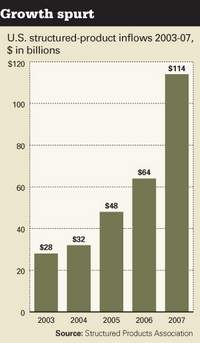By Brad Zigler
Reprinted from June 10, 2008 edition of seekingalpha.com
Slice the cake, pour the punch and let's hope we're not headed into the "terrible twos" now that two groundbreaking exchange-traded notes are celebrating their two-year anniversaries. The iPath S&P/GSCI Total Return Index ETN (NYSE Arca: GSP) and the iPath Dow Jones-AIG Commodity Index Total Return ETN (NYSE Arca: DJP) reached that milestone Friday.
Owners of the notes have reason to celebrate, too. The benchmarks tracked by both ETNs have sharply outdone both the stock and bond markets since their launch. The S&P/GSCI, for example, has risen at a compound annual rate of 21.9% since GSP's inception. The Dow-Jones-AIG Commodity Index, meanwhile, has cranked out a 16% annual return. Compared against the S&P 500's average annual return of 5.8% and the Lehman Aggregate Bond Index's 6.6% average gain, a dollop of commodity exposure, in retrospect, would have been a wise choice for most portfolio allocators. The commodity benchmarks' further value as portfolio diversifiers is manifested by their low correlations - 3.8% for S&P/GSCI and 10.4% for DJ-AICGI - to the S&P 500. Both commodity indexes are negatively correlated against the Lehman bond benchmark.
Issued by Barclays Bank plc, an operating unit of British financial-services giant Barclays plc, the iPath ETNs are 30-year senior zero-coupon debt securities that promise to pay investors their underlying commodity index returns, less annual fees of 0.75%.
ETN investors, thus, rely on Barclays to remain solvent until they liquidate their ETNs, trading off portfolio tracking error for credit risk. Unlike exchange-traded funds, there's no physical portfolio to manage with an ETN. Therefore, there are no frictional transactions to cause returns to vary from the benchmark: no commissions, no spreads and no timing error.
ETNs are more tax efficient than exchange-traded funds, too. Commodity ETFs hold futures contracts in portfolio that must be rolled forward, creating taxable events. In addition, portfolio positions open at year-end must be "marked to market" for tax settlement. Any capital gains realized from rolls and marking to market are treated as 60% long-term gains and 40% short-term, translating into a top blended tax rate of 23%.
Futures ETNs, though, are presently taxed as prepaid contracts, exposing investors to a tax liability only if a gain is recognized upon the ETNs' sale or when the notes mature. Holding the notes for more than a year, then, means the tax bite on gains max out at 15%.
For the full article from SeekingAlpha.com, click here.
Saturday, August 2, 2008
Subscribe to:
Post Comments (Atom)




No comments:
Post a Comment